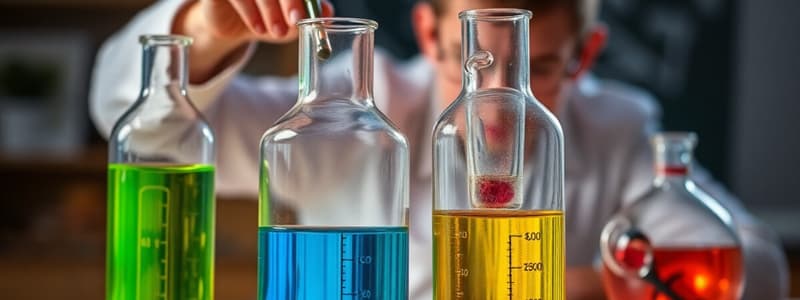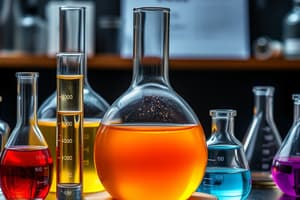Podcast
Questions and Answers
What is the correct sequence of steps in the scientific method?
What is the correct sequence of steps in the scientific method?
- Observation, Analysis, Hypothesis, Conclusion, Experiment
- Observation, Hypothesis, Experiment, Analysis, Conclusion (correct)
- Hypothesis, Observation, Experiment, Conclusion, Analysis
- Experiment, Conclusion, Analysis, Hypothesis, Observation
Which of the following is necessary for a hypothesis to be considered valid?
Which of the following is necessary for a hypothesis to be considered valid?
- It should be testable and falsifiable. (correct)
- It must be based on personal beliefs.
- It needs to be universally accepted.
- It can only explain phenomena that have been conclusively proven.
In an experiment testing the effect of light on plant growth, which of the following is the dependent variable?
In an experiment testing the effect of light on plant growth, which of the following is the dependent variable?
- The amount of water given to the plants
- The amount of light the plants receive
- The growth of the plants measured in height (correct)
- The type of plants used in the experiment
What is the smallest unit capable of all activities of life?
What is the smallest unit capable of all activities of life?
Which statement best describes homeostasis?
Which statement best describes homeostasis?
Which of the following factors is essential for establishing a valid hypothesis?
Which of the following factors is essential for establishing a valid hypothesis?
In an experiment evaluating the impact of fertilizer on crop yield, which of the following best describes the controlled variables?
In an experiment evaluating the impact of fertilizer on crop yield, which of the following best describes the controlled variables?
How do levels of biological organization from cells to organisms relate to one another?
How do levels of biological organization from cells to organisms relate to one another?
What best describes homeostasis within a biological system?
What best describes homeostasis within a biological system?
Which of the following steps is commonly associated with the scientific method after forming a hypothesis?
Which of the following steps is commonly associated with the scientific method after forming a hypothesis?
Flashcards
Scientific Method
Scientific Method
A systematic process used to investigate phenomena, gather data, and draw conclusions. It involves observation, hypothesis formation, experimentation, analysis, and communication of findings.
Valid Hypothesis
Valid Hypothesis
A testable prediction that can be supported or refuted through experimentation. It should be specific, measurable, achievable, relevant, and time-bound (SMART).
Independent vs. Dependent Variable
Independent vs. Dependent Variable
The independent variable is what the experimenter manipulates, while the dependent variable is the response or outcome being measured. Controlled variables are kept constant throughout the experiment.
Smallest Unit of Life
Smallest Unit of Life
Signup and view all the flashcards
Homeostasis
Homeostasis
Signup and view all the flashcards
What are the steps of the scientific method?
What are the steps of the scientific method?
Signup and view all the flashcards
What makes a hypothesis valid?
What makes a hypothesis valid?
Signup and view all the flashcards
Identify the variables
Identify the variables
Signup and view all the flashcards
What is the smallest unit of life?
What is the smallest unit of life?
Signup and view all the flashcards
What is homeostasis?
What is homeostasis?
Signup and view all the flashcards
Study Notes
The Scientific Method
- The scientific method is a systematic approach to acquiring knowledge.
- It's based on observation and experimentation.
- Steps in the scientific method:
- Observation: Notice a phenomenon or problem.
- Question: Ask a specific question about the observation.
- Hypothesis: Formulate a testable explanation or prediction.
- Experiment: Design and conduct a controlled experiment to test the hypothesis.
- Data Analysis: Collect and analyze the data from the experiment.
- Conclusion: Determine if the data supports or refutes the hypothesis.
- Communication: Share the results and conclusion with others.
Validity of a Hypothesis
- A valid hypothesis must be:
- Testable: Can be investigated and proven false.
- Falsifiable: Can be shown to be incorrect.
- Specific: Clear and unambiguous in its statement.
- Consistent with known observations/facts: Shouldn't contradict established science.
Identifying Variables in an Experiment
- Dependent variable: The variable measured or tested; it depends on the independent variable.
- Independent variable: The variable manipulated by the researcher.
- Controlled variables: Kept constant to isolate the effect of the independent variable on the dependent variable.
The Smallest Unit of Life
- The cell is the smallest unit capable of all activities of life.
- Cells form tissues, tissues form organs, organs form organ systems, organ systems form organisms.
Homeostasis
- Homeostasis is the ability of an organism to maintain a stable internal environment.
- This stability is vital for proper cell, tissue, and organ function.
- It involves various regulatory mechanisms.
Studying That Suits You
Use AI to generate personalized quizzes and flashcards to suit your learning preferences.




